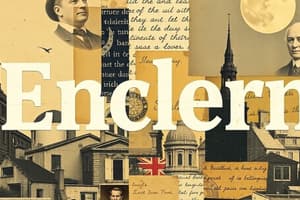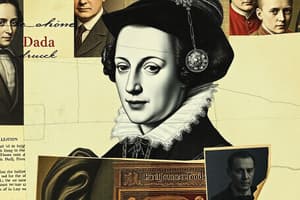Podcast
Questions and Answers
What is the time period associated with Early Modern English?
What is the time period associated with Early Modern English?
- 1450-1750 (correct)
- 1700-1800
- 1600-1700
- 1500-1800 (correct)
What period is considered the height of the English Renaissance?
What period is considered the height of the English Renaissance?
Elizabethan Age
What significant work did Thomas Wilson publish in 1553?
What significant work did Thomas Wilson publish in 1553?
The Art of Rhetorique
Which writers were prominent during the Elizabethan Age?
Which writers were prominent during the Elizabethan Age?
The period known as the Jacobean Age lasted from _____ to _____
The period known as the Jacobean Age lasted from _____ to _____
What major change in pronunciation occurred known as the Great Vowel Shift?
What major change in pronunciation occurred known as the Great Vowel Shift?
The Commonwealth Period lasted from 1649 to 1660.
The Commonwealth Period lasted from 1649 to 1660.
What was the first English dictionary published?
What was the first English dictionary published?
What was a distinguishing feature of the Neoclassical Period?
What was a distinguishing feature of the Neoclassical Period?
Who was known as the first woman novelist in England?
Who was known as the first woman novelist in England?
What important publication was released in 1611?
What important publication was released in 1611?
What was the significance of the year 1709 for English literature?
What was the significance of the year 1709 for English literature?
The first version of the Book of Common Prayer was published in _____
The first version of the Book of Common Prayer was published in _____
What did Nathaniel Bailey publish in 1721?
What did Nathaniel Bailey publish in 1721?
What did the English grammarians of 1760-1795 focus on?
What did the English grammarians of 1760-1795 focus on?
Flashcards are hidden until you start studying
Study Notes
Early Modern English
- Timeframe: 1500-1800 (some sources suggest 1450-1750).
- Basis for grammatical and orthographical conventions in Modern English.
- Encompasses significant literary and cultural periods such as the Renaissance, Neoclassical, and the beginning of the Romantic Period.
Elizabethan Age
- Duration: 1558-1603, marking the peak of the English Renaissance.
- Influenced by Medieval traditions and notable for prominent figures like William Shakespeare and Christopher Marlowe.
The Renaissance
- Spanning 1500-1660, the Renaissance includes the Elizabethan, Jacobean, Caroline, and Commonwealth periods.
- Characterized by a flourishing of arts and literature.
Jacobean Age
- Occurred from 1603-1625, noted for its sophistication and rivalry among writers.
- Famous works include the King James Bible and writings by John Milton, Thomas Hobbes, and Andrew Marvell.
Caroline Age
- Lasted from 1625-1649, focusing on poets and dramatists of the time.
Commonwealth Period
- Timeframe: 1649-1660, during which theaters were closed for 18 years due to moral and religious grounds.
Neoclassical Period
- Encompasses 1660-1785, heavily influenced by French literature.
- Known for its emphasis on philosophy, reason, skepticism, wit, and refinement, including the Restoration and the Augustan Age.
Restoration
- Period from 1660-1700 known for advancements in prose, poetry, and comedy.
- Key figures include Milton and John Dryden.
Augustan Age
- Lasted from 1700-1745, characterized by refinement and clarity in writing.
- Prominent authors include Jonathan Swift, Alexander Pope, and Daniel Defoe.
Age of Sensibility
- Duration: 1745-1785, focusing on instinct and feeling over judgment.
- Significant literary influences from medieval ballads and folk literature, with important figures such as Samuel Johnson and Samuel Richardson.
Great Vowel Shift
- A crucial phonetic change that occurred during the 15th to 17th centuries.
- Notable transformations include vowel pronunciations that shifted higher in the mouth.
Vocabulary Expansion
- Fresh borrowings contributed to the English vocabulary, notably Greek-derived suffixes like "-ize" and "-ism."
Acceptance of English
- By the late 16th century, English emerged as a widely accepted language of learning, rivaling classical languages.
Printing Press
- Facilitated the dissemination of literature and standardized the English language.
Book of Common Prayer
- Published in 1549, marking the first version of the Church of England's liturgical text introduced to English churches.
Thomas Wilson
- Authored "The Art of Rhetorique" in 1553, a pivotal text on logic and rhetoric in English.
Queen Elizabeth I
- Ascended to the throne in 1558, playing a crucial role in the English Renaissance.
First Grammar of English
- Published by William Bullokar in 1586, marking a significant development in English linguistic studies.
William Shakespeare
- Active from 1590-1611, recognized for masterpieces like "Romeo & Juliet," "Hamlet," and "Macbeth."
First English Dictionary
- Robert Cawdrey's "Table Alphabeticall" published in 1604, laying foundations for English lexicography.
King James Bible
- Authorized version published in 1611, shaping English literature and written language.
First English Newspaper
- "Weekly News" launched in 1622 in London, marking the beginning of formal journalism in English.
Aphra Behn
- Became the first woman novelist in England with her publication of "Oroonoko" in 1688.
Copyright Act
- Enacted in England in 1709, establishing legal protection for creative works.
Nathaniel Bailey
- Published "Universal Etymological Dictionary" in 1721, a pioneering work in English lexicography.
Rise of English Grammarians
- Between 1760-1795, prominent grammarians emerged, including Joseph Priestley and Robert Lowth.
Andreas Vesalius
- Influential anatomist and physician known for "De humani corporis fabrica" (1514-1564).
Montesquieu
- A notable French political thinker and philosopher (1689-1755) impacting Enlightenment thought.
Archaizers
- Term for scholars favoring the revival of obsolete words in English, with Edmund Spenser as a prominent advocate.
Inkhorn Terms
- Criticized Latinate expressions in writing, regarded as unnecessary overcomplications.
Purists
- Scholars in the 16th century advocating for innovation in language using existing English resources rather than excessive borrowing from classical languages.
Sir Thomas Smith
- Author of a detailed phonetic treatise in 1568, examining the sounds of English.
Elizabeth Cary
- Published "The Tragedy of Mariam" in 1613, marking the first original play by a woman in English.
First Pencil
- Invented by Conrad Gesner in 1564, identified as a prototype Shakespeare may have used.
Modern Pencil
- Developed in 1795 by Nicholas-Jacques Conte, incorporating graphite and clay for practical use.
Alexander Pope
- 18th-century poet noted for satirical verse and for translating Homer, famous for his use of the heroic couplet.
Studying That Suits You
Use AI to generate personalized quizzes and flashcards to suit your learning preferences.




